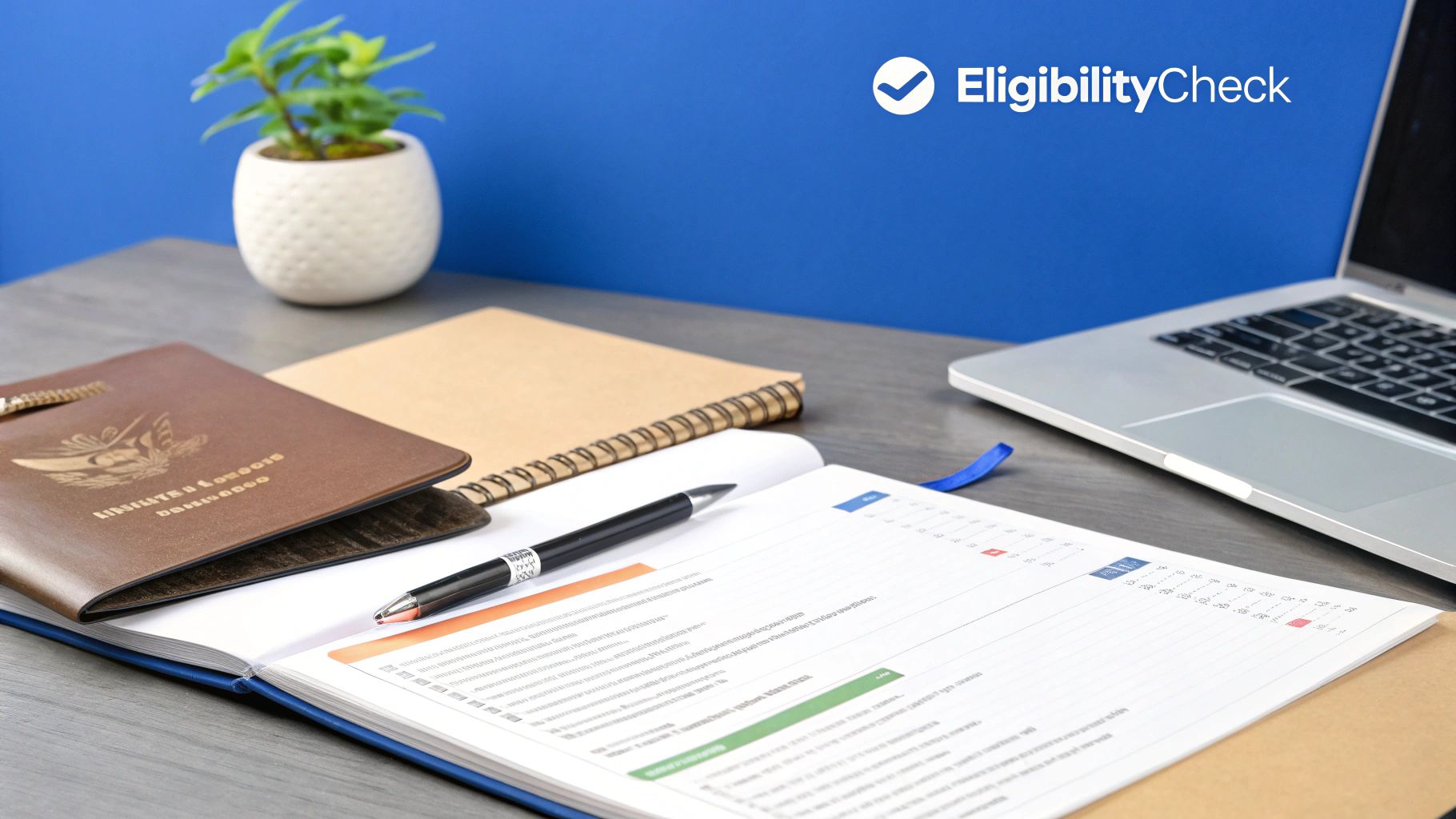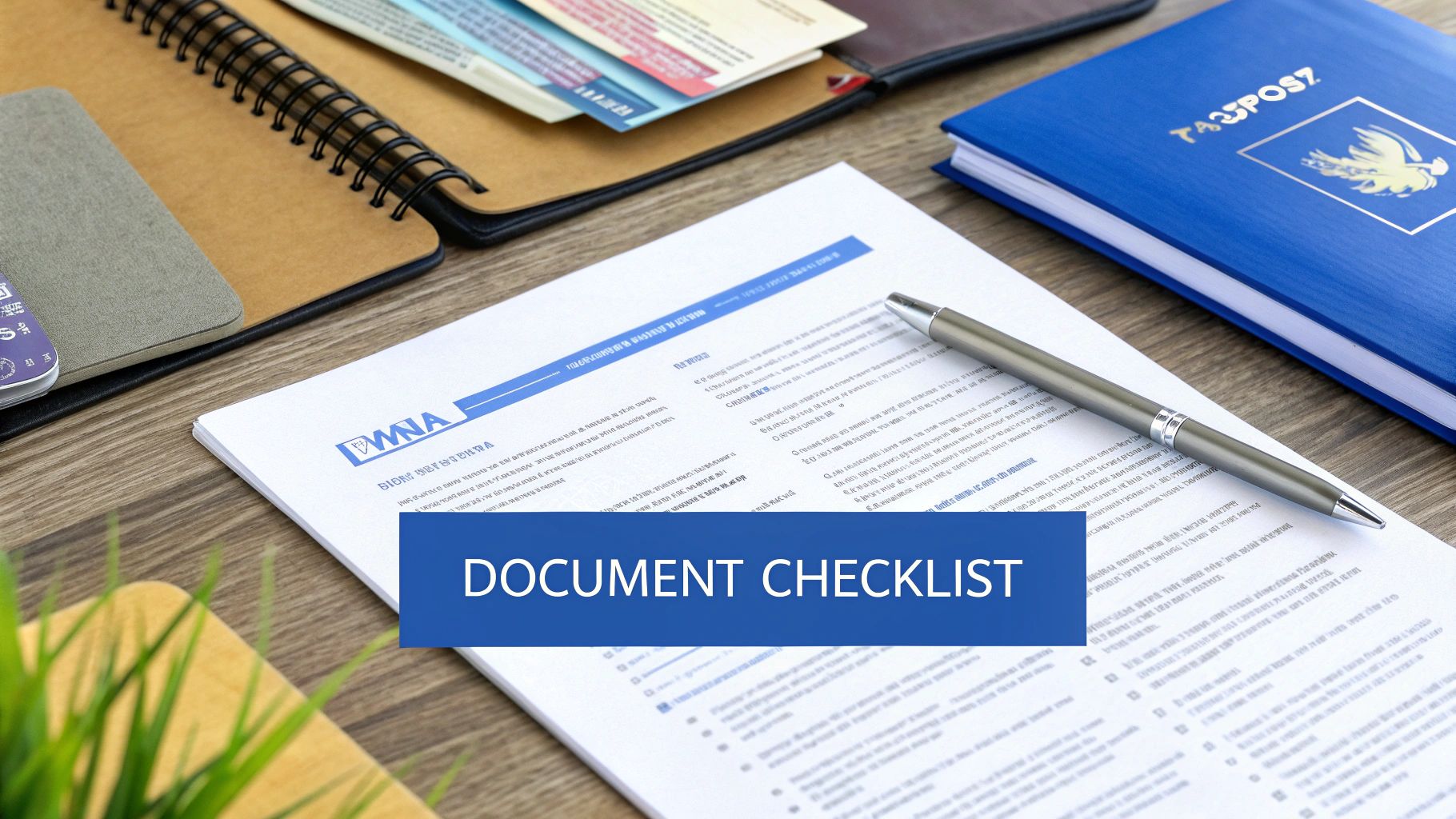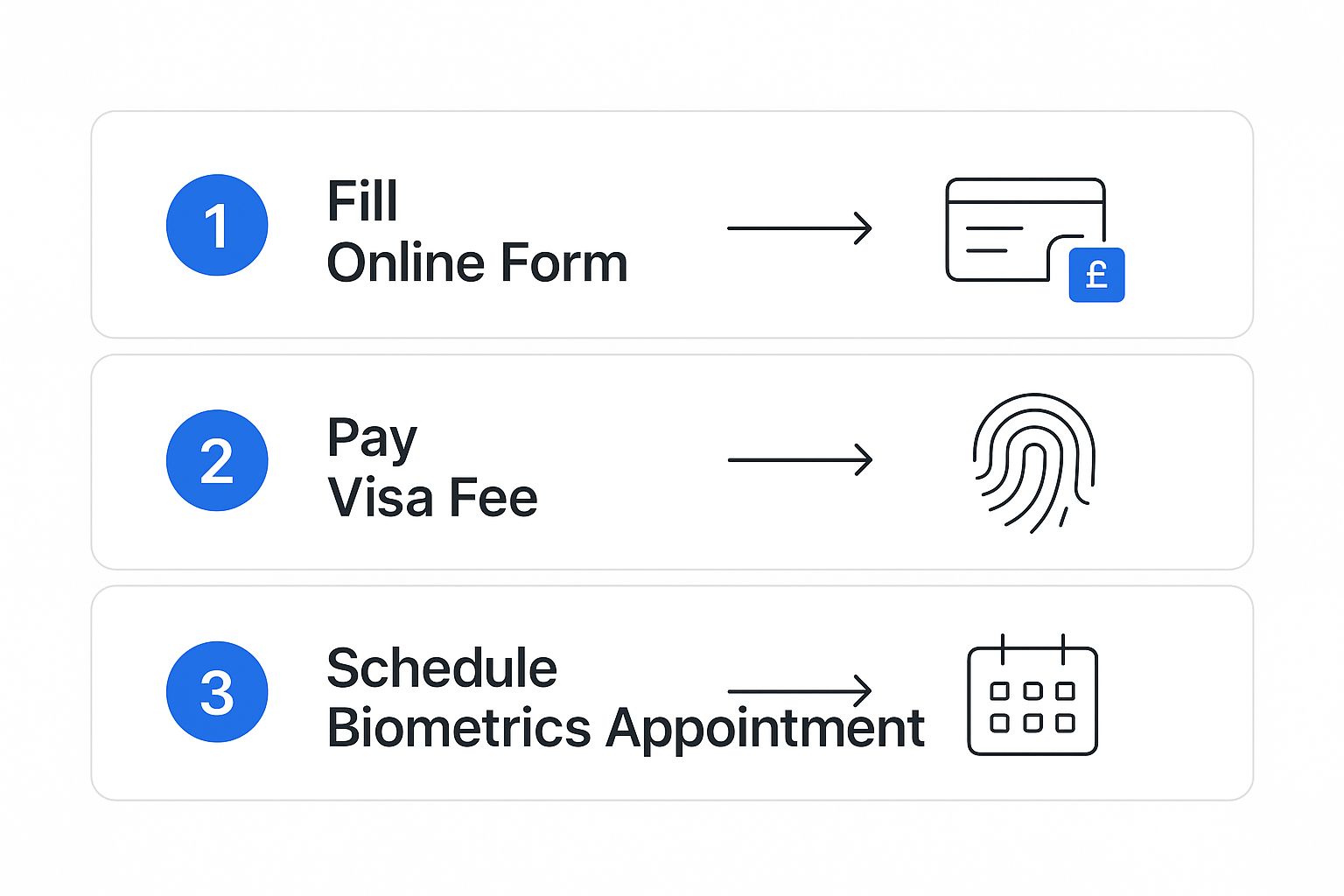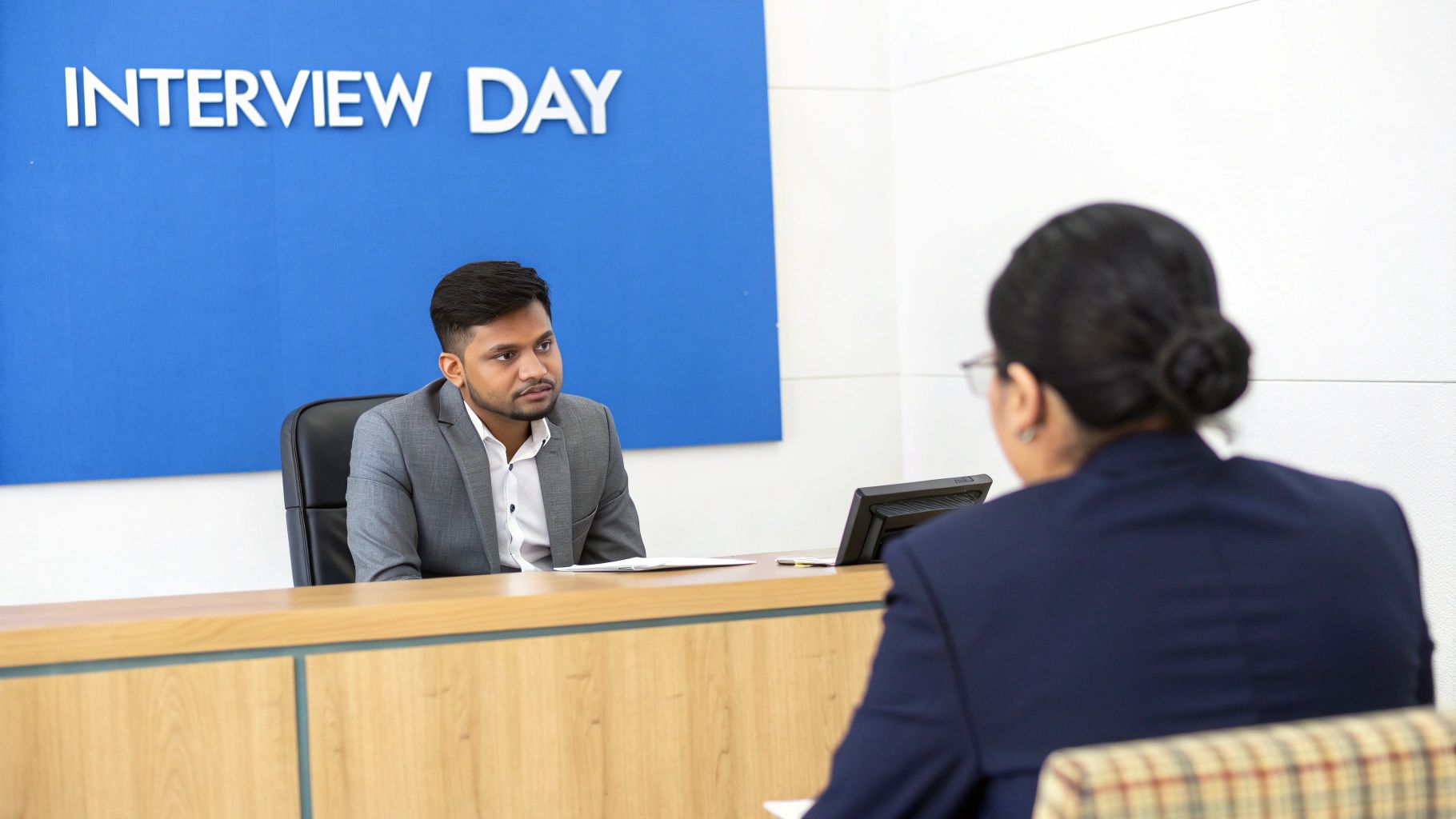How to Apply for UK Visa from Nigeria: Your Practical Guide

Applying for a UK visa from Nigeria can feel daunting, but it all boils down to a clear, step-by-step process. It all starts on the official GOV.UK website, which is where you'll fill out your form, pay the fees, and eventually book your biometrics appointment at a TLScontact centre here in Nigeria.
Your First Steps for a UK Visa from Nigeria
So, you're planning to 'japa' to the UK, whether for a short visit, to study, or for work. Before you get lost in a sea of paperwork and conflicting advice from agents, let's break down the very first things you need to do. Think of this as laying the foundation for a successful application. Right now, it’s not about gathering every single document, but about understanding your journey and knowing exactly which path to take.
Your main goal at this stage is simple: figure out precisely why you're travelling and match that reason to the correct visa category. Getting this right from the start saves you a world of trouble later on.
Identifying the Right Path for Your Trip
Before you even touch an application form, ask yourself the most important question: "Why am I actually going to the UK?" The answer changes everything.
Are you planning a two-week holiday to explore London? Or maybe you've been accepted to study at the University of Manchester? Perhaps you've landed a job with a UK-based company. Each of these reasons points to a completely different type of visa.
Here's a quick look at the most common visa types for Nigerians to help you find your footing.
Which UK Visa Is Right for You?
This table gives a quick summary of the most common UK visa types for Nigerian applicants, helping you identify the best fit for your trip.
| Visa Type | Primary Purpose | Best Suited For |
|---|---|---|
| Standard Visitor Visa | Tourism, visiting family, short business trips | Holidaymakers, people visiting relatives, attending a conference or short-term training. |
| Student Visa | Full-time study at a UK institution | Individuals with an offer from a licensed UK university or college to pursue a degree or course. |
| Skilled Worker Visa | Professional work with a UK employer | Professionals with a confirmed job offer and a Certificate of Sponsorship from a licensed UK company. |
Choosing the wrong category is one of the fastest routes to a visa refusal, which means you lose both your time and the application fee (which is paid in dollars, so you feel the pain!). It’s absolutely critical to get this right. To dig deeper into the specifics, you can learn more about the different UK visa types and their requirements.
Using the Official GOV.UK Website
Let me be clear: your one and only source of truth for this process is the UK government's official website, GOV.UK. Forget the "expert" advice you heard from a friend's cousin or a random agent in Ikeja. The official site has the most current eligibility rules, document checklists, and the application portal itself. It's your instruction manual.
Take your time on the GOV.UK website. Read everything. The rules change often, so relying on outdated information is a gamble you don't want to take. Success depends on following the official, up-to-date guidance.
Get comfortable with how the site works. There's a handy visa search tool where you can enter your nationality (Nigerian), your reason for visiting, and your intended length of stay. This tool will point you straight to the specific visa you need and lay out all the rules you have to follow. This simple step cuts through all the noise and makes sure you start your application with accurate information, directly from the source.
Choosing the Right Visa for Your UK Trip

Getting this first step right is absolutely crucial. Picking the wrong visa isn't just a small mistake; it's often a one-way ticket to a refusal. That means you lose your application fee and have to start the whole stressful process from scratch.
Let's break down what these visa categories actually mean for you as someone applying from Nigeria.
The Standard Visitor Visa and Proving Your Ties
This is the go-to visa for most Nigerians heading to the UK for a short trip—whether it's for tourism, visiting family for a wedding, or attending a quick business meeting.
The biggest challenge isn't the form itself. It's proving one thing beyond any doubt: you have strong ties to Nigeria and will definitely return home after your visit.
So, what do "strong ties" look like in real life? The UK Visas and Immigration (UKVI) officer needs to see solid proof that your life is anchored in Nigeria.
- Steady Employment: A letter from your employer confirming your job, salary, and approved leave for your trip is gold. It shows you have a job waiting for you.
- Family Commitments: Having a spouse, children, or elderly parents you care for in Nigeria shows you have serious responsibilities to come back to.
- Property Ownership: Documents showing you own land or have a formal tenancy agreement in your name are excellent proof of a permanent base in Nigeria.
Put yourself in the visa officer's shoes. Their main job is to filter out potential overstayers. Your documents need to paint a clear, undeniable picture of a genuine visitor with every reason to return to Nigeria.
Student and Skilled Worker Visas: The Sponsorship Keys
If your goal is to study or work in the UK, your entire application depends on a special document from your future university or employer. These visas are built on a points-based system, and without sponsorship, you're going nowhere.
For students, this magic key is the Confirmation of Acceptance for Studies (CAS). Your university will issue this electronic document once you've met their academic conditions and paid your tuition deposit. It gives you a unique reference number that you must enter on your visa form, officially confirming you have a legitimate place to study.
For professionals, the equivalent is the Certificate of Sponsorship (CoS). This comes from a UK employer that is licensed by the Home Office to hire foreign workers. The CoS outlines the job you've been offered, your salary, and confirms you meet the required skill level. A Skilled Worker visa application is dead in the water without a valid CoS.
For a deeper dive into the costs involved, check out our guide on the UK work visa cost and its components.
The Health and Care Worker Visa: A Changing Landscape
This visa has been a major pathway for Nigerian doctors, nurses, and other healthcare professionals. While it's a part of the Skilled Worker category, it has traditionally come with perks like lower salary requirements and an exemption from the costly Immigration Health Surcharge.
However, you must be aware of the major policy changes that have recently come into effect. The UK government has significantly tightened the rules, and this has hit Nigerian applicants hard.
The most significant change is that care workers and senior care workers are no longer allowed to bring their dependants (spouses and children) with them to the UK. This rule change is a direct response to the high number of dependants who came with care workers previously.
Knowing these details is vital. If you are a nurse or doctor, you can still bring your family. But if your CoS is for a 'care worker' role, this new restriction applies to you. Each visa category has its own specific, unbending rules, and selecting the correct one from the very beginning is the only way to set yourself up for success.
Assembling Your Supporting Documents

Alright, you've picked your visa route. Now comes the part that feels like a mountain of paperwork: gathering your supporting documents. It’s easy to get overwhelmed, but I want you to think about this differently. Your documents are your voice in this process. They're what you use to tell the visa officer your story and prove, without a doubt, that you meet all the rules.
This isn’t just about ticking boxes; it's about building a strong, believable case for yourself. Every single paper you submit must have a clear purpose and directly back up the claims you’ve made on your form.
The Core Documents for Most Nigerian Applicants
No matter what UK visa you’re going for, a few documents are almost always on the list. Nailing these first gives you a solid foundation to build on.
- Your International Passport: This is non-negotiable. It must be valid for your entire planned stay and have at least one completely blank page for the visa sticker.
- Proof of Financial Stability: We’ll get into the nitty-gritty of this, but it essentially means bank statements showing you can pay for your trip and support yourself.
- Evidence of Accommodation: This could be hotel reservations for a visit or a tenancy agreement if you're relocating for a job or to study.
- Proof of Ties to Nigeria: The UK government needs to see that you have strong reasons to return home (unless you're on a settlement route). This can be a letter from your employer, property ownership documents, or evidence of close family (like birth certificates for your children).
If you're applying for a work or study visa, your professional background is under the microscope. That’s where creating a compelling CV becomes incredibly important. It’s your chance to present your skills and experience in a way that’s impossible to ignore.
Mastering Your Proof of Funds
Let me be direct: your bank statements are one of the most critical parts of your application. The UK Visas and Immigration (UKVI) officer isn't just glancing at your final balance; they are combing through your transaction history.
What they’re looking for is a consistent pattern of income and spending, usually over the last six months. A huge, last-minute deposit is one of the biggest red flags you can raise. This practice, known as 'funds parking', immediately suggests the money isn't really yours and was just borrowed to make your account look good. It's a classic reason for refusal.
The story your bank statement tells is far more important than the final number. It has to make sense. If your salary is N800,000 a month, a sudden N15 million deposit needs a rock-solid explanation, like a documented car sale or a gift letter with the sponsor's own bank statement.
To stay in the clear, make sure your statements show your salary arriving like clockwork and your savings growing steadily over time. If a large sum came from a gift, you absolutely must include a formal letter from the person who gave you the money, plus proof that they could afford to give it.
Preparing Your Financial Documents
Getting your proof of funds right is crucial. It’s an area where many applications from Nigeria falter due to simple, avoidable errors. This table breaks down the key things to do versus what to avoid at all costs.
| Do | Don't |
|---|---|
| Provide official statements for the last 6 months showing consistent income and savings. | Submit statements with a large, unexplained deposit just before you apply. |
| Make sure the name on your bank account is an exact match to your passport and application. | Rely on a sponsor's bank statement without an official, signed sponsorship letter. |
| Submit official, bank-stamped copies for every single account you're using as proof. | Use statements from accounts that don't logically connect to your stated salary or savings habits. |
| Proactively explain any large or unusual transactions with supporting evidence. | 'Borrow' money to temporarily inflate your account balance ('funds parking'). |
By following these guidelines, you present a financial profile that is clear, credible, and much more likely to be accepted by the UKVI.
Visa-Specific Document Requirements
Beyond the basics, each visa route has its own set of mandatory documents. These aren't optional extras; missing even one will almost certainly lead to a refusal.
For example, if you're a Nigerian applying for any visa longer than six months, you must provide a Tuberculosis (TB) test certificate. You can't just get this from your local clinic. It has to be done at a UKVI-approved medical centre in Nigeria, which are located in Lagos and Abuja.
Likewise, Skilled Worker visa applicants need their Certificate of Sponsorship (CoS) from their UK employer. For students, it’s the Confirmation of Acceptance for Studies (CAS) from their university. These documents are the keys to your application. Always, always double-check the specific document checklist on the official GOV.UK website for your visa category to make sure you have everything covered.
Navigating the Online Form and Biometrics
Alright, you’ve got your documents sorted. Now for the main event: tackling the official online application form. This is where you formally present your case to the UK government. Once that’s done, you'll book your in-person appointment to provide your fingerprints and photo—what they call your biometrics.
Tackling the GOV.UK Application Form
First things first, you need to head over to the official GOV.UK website to start your application. Let me be frank: this form is long and incredibly detailed. My number one piece of advice? Do not rush it. Rushing is a recipe for mistakes, and even a tiny inconsistency between your form and your documents can cause serious headaches later on.
The good news is you don’t have to finish it all at once. The system lets you save your progress and come back to it. I always tell people to treat it like a mini-project, not a mad dash to the finish line. Work on a section, save it, and step away. Coming back with fresh eyes helps you spot errors you might have missed.
Here’s what the official starting page looks like. Make sure you’re on this exact page to avoid any unofficial, scammy websites.

The form will ask about everything imaginable—your personal details, your entire travel history, your financial situation, and your family background. Absolute honesty and consistency are non-negotiable here. If you took a two-week trip to Ghana five years ago, you need to mention it. If you were ever refused a visa for any country, you must declare it and briefly explain what happened. Trying to hide something is the quickest way to get a refusal, and possibly even a 10-year ban.
My Golden Rule: Your application form should tell the exact same story as your documents. If you state your monthly salary is N800,000, your employment letter and bank statements must back that up perfectly. Any contradiction plants a seed of doubt in the visa officer’s mind.
Once you’ve triple-checked every single entry and feel confident, you’ll submit the form and pay the visa application fee online. This fee changes depending on your visa type and has to be paid in US dollars with a valid debit or credit card. Just remember, this payment is non-refundable, no matter the outcome.
Booking Your Biometrics Appointment
After your payment goes through, the system will automatically direct you to the website for TLScontact, the company that handles biometrics for UKVI in Nigeria. This is where you'll book your compulsory appointment at one of their centres, like the ones in Victoria Island (Lagos) or Abuja.
This is a make-or-break step. Your application isn't considered complete until you’ve attended this appointment.
At the TLScontact centre, you'll have your fingerprints scanned and a digital photo taken. This is also when you'll formally submit all those documents you gathered. You’ve got a couple of options for how to do this:
- Self-Upload: Before your appointment, you can scan and upload your documents to the TLScontact portal yourself. It’s free, but you’ll need a decent scanner and a bit of patience to make sure every file is clear and correctly labelled.
- Assisted Scanning: If you're not comfortable doing it yourself or don't have a scanner, you can pay an extra fee at the centre. The staff will scan and upload everything for you on the day. It offers peace of mind for many applicants.
Choosing the Right Service Level
While booking your slot, you’ll notice different service options pop up. The standard appointment is included in what you’ve already paid, but TLScontact offers faster processing for an additional, often hefty, fee.
- Standard Service: This is the default. Processing times can vary, often taking several weeks.
- Priority Visa (PV): For an extra fee (often hundreds of dollars), they aim to make a decision within 5 working days.
- Super Priority Visa (SPV): The most expensive option, aiming for a next-working-day decision.
A word of caution: paying for these priority services does not increase your chances of getting the visa. It only speeds up the processing time. If your application is complicated or needs extra background checks, it can still be delayed, even if you paid for a super-fast service. Think carefully about whether the significant extra cost is truly necessary for your travel plans.
The Waiting Game: What Happens After You Apply
You’ve done it. The online form is submitted, the fees are paid, and your biometrics are locked in. Now for the part that everyone finds a bit nerve-wracking: the wait. Your application is officially in the hands of a UK Visas and Immigration (UKVI) officer, and it’s completely normal to feel a little on edge. Knowing what’s happening behind the scenes can really help manage the anxiety.
First off, let’s talk about timing. Processing times can be all over the place depending on the visa you’ve applied for and how busy the home office is. A Standard Visitor visa usually takes about three weeks. Skilled Worker or Student visas often fall within a similar timeframe, but don't be surprised if they take a bit longer. Your best bet is to always check the official GOV.UK website for the latest service standards for applications coming from Nigeria. These timelines change, so stay updated.
Tracking Your Application and Keeping Calm
After your biometrics appointment at TLScontact, they'll typically send you email updates. You’ll get one when your application is on its way to UKVI and another when a decision has been made. You can also pay a little extra for SMS updates if you prefer. As tempting as it is to refresh your inbox every five minutes, my best advice is to try and be patient.
Sometimes, you might get an email saying your application is “not straightforward.” Your heart might skip a beat, but don't panic. This is almost never a refusal. It usually just means the visa officer needs to double-check a document or your case has some unique element that requires a closer look. It simply means the wait will be a bit longer.
While you're waiting and making plans, it’s a smart move to get a handle on how healthcare works in the UK. Figuring this out early can prevent a lot of headaches later. This guide on Understanding the UK's Healthcare System: NHS vs. Private Options is a fantastic starting point.
The Decision Is In: What to Do Next
The final email you receive will be short and to the point: your passport is ready for collection. This is the moment of truth. You won’t actually know the outcome of your application until you have that passport back in your hands.
When you collect it, open it right there and then.
If your visa has been approved, you'll find a sticker inside. This is called a vignette.
Crucial Tip: The very first thing you must do is check your visa vignette for errors. Seriously. Make sure your name, date of birth, passport number, and the visa type are all 100% correct. A tiny mistake can turn into a massive headache at the UK border. It’s far easier to get it fixed in Nigeria than after you’ve landed.
This vignette acts as your temporary entry pass into the UK and is usually valid for 90 days.
If you've applied for a long-stay visa (like for work or study), your full visa isn't the sticker. It comes in the form of a Biometric Residence Permit (BRP). This is a plastic card, similar to a driver's licence, which you must collect from a specific Post Office in the UK within 10 days of arriving. Your BRP is your official proof of your right to live, work, or study in the UK.
Frequently Asked Questions

Navigating the UK visa process can bring up a lot of questions. Here are clear, no-nonsense answers to some of the most common queries we see from Nigerian applicants.
How Much Money Do I Need for a UK Visitor Visa from Nigeria?
There’s no magic number set in stone. The real focus is on proving you can comfortably fund your entire trip—flights, accommodation, daily expenses—without needing to work or access public funds in the UK.
What visa officers want to see is a consistent financial history. Providing at least six months of bank statements that show a stable salary coming in and savings building up is far more convincing than a large, last-minute deposit. That kind of activity looks like ‘funds parking’ and is a major red flag that often leads to a refusal.
Can I Get a Faster Decision on My Visa in Nigeria?
Absolutely. The TLScontact centres in Nigeria offer optional Priority and Super Priority services for an additional fee. These services can significantly cut down the waiting time, aiming for a decision in about five working days for Priority or even by the next working day for Super Priority.
It's crucial to remember that you're paying for speed, not a guaranteed approval. A Priority service simply moves your application to the front of the queue; it does not influence the decision itself. Complex applications can still face delays.
What Are the Most Common Reasons for a UK Visa Refusal for Nigerians?
Time and again, we see refusals boil down to two key areas: insufficient proof of funds and weak "ties to home." The visa officer needs to be convinced you have a compelling reason to return to Nigeria after your visit, like a stable job, family responsibilities, or property you own.
Another common pitfall is inconsistency. If the information on your application form doesn't perfectly match your supporting documents, it creates doubt. Honesty, clarity, and providing verifiable proof are your best tools for building a successful application.
What Happens If My UK Visa Application Is Refused?
When a visa is refused, you'll get a letter detailing exactly why the decision was made. For standard visitor visas, your options are usually limited, as there's typically no right to an administrative review or a formal appeal.
The most practical path forward is often to submit a completely new application. This time, however, you must meticulously address every single point raised in the refusal letter to show you've corrected the previous issues.
Getting your UK plans in order can feel overwhelming, but you don’t have to do it alone. For instant, AI-powered answers tailored to your specific immigration questions, check out JapaChat. It helps you build a solid plan with confidence. Get the clarity you need by visiting JapaChat's official website today.

Leave a Reply